Notes for episode number 101 – Exam 25 Exam 25 ... - Libsyn
Notes for episode number 101 – Exam 25 Exam 25 ... - Libsyn
Notes for episode number 101 – Exam 25 Exam 25 ... - Libsyn
You also want an ePaper? Increase the reach of your titles
YUMPU automatically turns print PDFs into web optimized ePapers that Google loves.
<strong>Notes</strong> <strong>for</strong> <strong>episode</strong> <strong>number</strong> <strong>101</strong> <strong>–</strong> <strong>Exam</strong> <strong>25</strong><br />
<strong>Exam</strong> <strong>25</strong>. Dvidešimt penktas egzaminas. This is a quick<br />
response <strong>episode</strong>! We’ll say the word or phrase in English - you<br />
say it in Lithuanian <strong>–</strong> Out Loud! It’s too late <strong>for</strong> questions, the<br />
exam starts now. Ready, set, go! Pasiruošti, dėmesio, marš!<br />
to speak kalbėti<br />
I speak aš kalbu<br />
you speak (familiar) tu kalbi<br />
he speaks jis kalba<br />
she speaks ji kalba<br />
we speak mes kalbame<br />
you speak jūs kalbate<br />
you all speak jūs kalbat<br />
all of you speak jūs kalbate<br />
they speak (all males / male/fem group) jie kalba<br />
they speak (all females) jos kalba<br />
Lithuanian lietuviškai<br />
English angliškai<br />
Spanish ispaniškai<br />
Malaysian malaiziškai<br />
French prancūziškai<br />
Chinese kiniškai<br />
Russian rusiškai<br />
German vokiškai<br />
Polish lenkiškai<br />
Japanese japoniškai<br />
Dutch olandiškai<br />
Italian itališkai<br />
Latvian latviškai<br />
Swahili svahiliškai<br />
Croatian kroatiškai<br />
Portuguese portugališkai<br />
Arabic arabiškai<br />
Turkish turkiškai<br />
Indonesian indoneziškai<br />
I speak Lithuanian aš kalbu lietuviškai<br />
repeat please prašom pakartoti<br />
I speak English aš kalbu angliškai<br />
I speak Chinese aš kalbu kiniškai<br />
I speak Malaysian aš kalbu malaiziškai<br />
I speak English and Lithuanian aš kalbu angliškai ir lietuviškai<br />
I speak Spanish and Lithuanian aš kalbu ispaniškai ir lietuviškai<br />
I speak French and Russian aš kalbu prancūziškai ir rusiškai
I speak Indonesian aš kalbu indoneziškai<br />
do you speak German? ar tu kalbi vokiškai?<br />
do you speak Polish? ar tu kalbi lenkiškai?<br />
do you speak Chinese? ar tu kalbi kiniškai?<br />
does he speak Japanese? ar jis kalba japoniškai?<br />
does he speak Dutch? ar jis kalba olandiškai?<br />
does he speak Indonesian? ar jis kalba indoneziškai?<br />
does she speak Malaysian? ar ji kalba malaiziškai?<br />
come here! ateik čia!<br />
I’m gonna kill you! aš tave užmušiu!<br />
<strong>Notes</strong> <strong>for</strong> <strong>episode</strong> <strong>number</strong> 102 - Profesijos Professions<br />
Hi there! This is Jack and welcome back to Lithuanian Out Loud! Well, a lot has been happening since<br />
our last show. Be<strong>for</strong>e today’s <strong>episode</strong> I want to get you caught up with the latest news. At least four news<br />
portals picked up a news article on Lithuanian Out Loud and we have many new listeners to our podcast.<br />
Also, it looks like some magazines might be doing some stories as well. Super! Welcome to all our new<br />
listeners!<br />
If you’d like to see the internet articles on Lithuanian Out Loud you can see the links on this <strong>episode</strong>’s<br />
notes on our blogpage. A big thanks to Deimantė Doksaitė <strong>for</strong> interviewing Raminta and me and <strong>for</strong><br />
writing the story. Labai ačiū, Deimante!<br />
Remember the plug Bayram of Turkey gave us recently? Well, he just sent me an email. He was in<br />
Vilnius today in a coffee shop working on his computer and he heard a familiar voice. He went up to the<br />
woman and asked her some questions and then gave her a big hug. Raminta was really surprised someone<br />
had recognized her voice while she was chatting with a friend in a Vilnius coffee shop. What a coincidence!<br />
Thanks <strong>for</strong> the email Bayram!<br />
Today we have a special guest on the show. Someone who might be contributing something to Lithuanian<br />
Out Loud on a regular basis <strong>for</strong> a long time to come <strong>–</strong> I hope. So, here is Agnė from Vilnius or Agnė iš<br />
Vilniaus and her first contribution to the show.<br />
"čiau braške, susitiksim kompote"<br />
Agnė says this phrase is used by a lot by children in Lithuania to say goodbye. The literal translation isn’t<br />
really important, it’s better to learn this as a whole phrase, but <strong>for</strong> those of you who are curious it means,<br />
"goodbye, strawberry, see you in kompotas." Kompotas is a Lithuanian stewed fruit drink <strong>–</strong> very yummy.<br />
Here is it again, slowly…<br />
čiau braške, susitiksim kompote<br />
čiau braške, susitiksim kompote<br />
čiau braške, susitiksim kompote<br />
čiau braške, susitiksim kompote<br />
Again, Agnė says children use this a lot but adults use it as a joke or in order to sound funny. Try it on<br />
your Lithuanian friends.<br />
Agnė has a few hundred ideas on future contributions to the show and we love having her enthusiasm in<br />
our community. Thanks a million, Agne and welcome to the program! It’s super having you here with us.
Okay, enough notes, let’s get on with today’s <strong>episode</strong>, enjoy!<br />
---<br />
Hi there, I’m Raminta and I’m Jack and welcome back to Lithuanian Out Loud where we offer the world<br />
the Lithuanian language.<br />
Today we’re in a new month! July was named <strong>for</strong> Julius Caesar or Julijus Cezaris who was born in this<br />
month. In Lithuanian this month is liepa, the linden tree, which flowers during this month. The flowers<br />
scent the air, are used to make herbal teas and attract honeybees. Pretty tree!<br />
According to Wikipedia, Austėja is the ancient Lithuanian household goddess of bees. Austėja is a goddess<br />
of fertility, brides, and growing families. Austėja is the wife of Bubilas.<br />
Bubilas is the household god of bees. People may have sacrificed honey to Bubilas. They believed that<br />
doing so would make bees swarm better.<br />
pradėkime, let’s get started<br />
Today let’s talk about work. Here’s a Lithuanian proverb:<br />
Kas skaito ir rašo, tas duonos neprašo. He who learns to read and write will not beg <strong>for</strong> bread.<br />
Most of the time a person’s job has the suffix <strong>–</strong>tojas or <strong>–</strong>toja, <strong>–</strong>ėjas or <strong>–</strong>ėja, and <strong>–</strong>ininkas or <strong>–</strong>ininkė.<br />
Here we’ll list some infinitive verbs and then we’ll list the job title that follows it.<br />
to work dirbti<br />
a male worker darbininkas<br />
a female worker darbininkė<br />
to farm ūkininkauti<br />
a male farmer ūkininkas<br />
a female farmer ūkininkė<br />
to sing dainuoti<br />
a male singer dainininkas<br />
a female singer dainininkė<br />
to cure gydyti<br />
a male doctor gydytojas<br />
a female doctor gydytoja<br />
to drive vairuoti<br />
a male driver vairuotojas<br />
a female driver vairuotoja<br />
to write rašyti<br />
a male writer rašytojas<br />
a female writer rašytoja<br />
to help padėti<br />
a male assistant padėjėjas<br />
a female assistant padėjėja<br />
to give or to serve paduoti<br />
a male waiter padavėjas<br />
a female waiter padavėja<br />
to sell parduoti<br />
a salesman pardavėjas<br />
a saleswoman pardavėja
The last three professions we purposely put together because they look and sound so similar. It’s worth<br />
the ef<strong>for</strong>t to memorize these.<br />
padėjėjas<br />
padavėjas<br />
pardavėjas<br />
padėjėja<br />
padavėja<br />
pardavėja<br />
Now some job titles that don’t follow these rules…<br />
to lead vadovauti<br />
a male manager vadovas<br />
a female manager vadovė<br />
to be a lawyer or barrister advokatauti<br />
a male lawyer or barrister advokatas<br />
a female lawyer/attorney advokatė<br />
to control kontroliuoti<br />
a male controller kontrolierius<br />
a female controller kontrolierė<br />
to direct direktoriauti<br />
a male director direktorius<br />
a female director direktorė<br />
Now, just be<strong>for</strong>e we finish, let’s combine some of these. To do this we have to use kilmininkas.<br />
a lawyer’s female assistant advokato padėjėja<br />
an attorney’s male assistant advokato padėjėjas<br />
a director’s female assistant direktoriaus padėjėja<br />
a director’s male assistant direktoriaus padėjėjas<br />
Puiku! Excellent! You made it to the end of another <strong>episode</strong>! Puiku!<br />
<strong>Notes</strong> <strong>for</strong> <strong>episode</strong> <strong>number</strong> 0103 - <strong>Exam</strong> 26 - Voicemail 206-202-4745<br />
<strong>Exam</strong> 26. Dvidešimt šeštas egzaminas. This is a quick response <strong>episode</strong>! We’ll say the word or phrase in<br />
English and you say it in Lithuanian <strong>–</strong> Out Loud! It’s too late <strong>for</strong> questions, the exam starts now. Ready,<br />
set, go! Pasiruošti, dėmesio, marš!<br />
first pirmas<br />
second antras<br />
third trečias<br />
fourth ketvirtas<br />
fifth penktas<br />
sixth šeštas<br />
seventh septintas<br />
eighth aštuntas<br />
ninth devintas<br />
tenth dešimtas<br />
Monday pirmadienis<br />
slang <strong>for</strong> Monday <strong>–</strong> the hard day sunki diena<br />
Tuesday antradienis<br />
Wednesday trečiadienis
Thursday ketvirtadienis<br />
Friday penktadienis<br />
Saturday šeštadienis<br />
Sunday sekmadienis<br />
to not speak nekalbėti<br />
I don’t speak aš nekalbu<br />
you don’t speak (familiar) tu nekalbi<br />
he doesn’t speak jis nekalba<br />
she does not speak ji nekalba<br />
we don’t speak mes nekalbame<br />
you don’t speak jūs nekalbate<br />
all of you don’t speak jūs nekalbate<br />
they don’t speak (mm/mf) jie nekalba<br />
they don’t speak (ff) jos nekalba<br />
Good luck! sėkmės!<br />
I don’t speak English aš nekalbu angliškai<br />
I don‘t speak Chinese aš nekalbu kiniškai<br />
I don’t speak Indonesian aš nekalbu indoneziškai<br />
I speak Spanish aš kalbu ispaniškai<br />
I speak Spanish well aš gerai kalbu ispaniškai<br />
what does she speak? kaip ji kalba?<br />
she speaks Italian ji kalba itališkai<br />
I don’t speak Italian very well aš kalbu itališkai nelabai gerai<br />
she speaks Swahili ji kalba svahiliškai<br />
she doesn’t speak Swahili ji nekalba svahiliškai<br />
we speak Croatian mes kalbame kroatiškai<br />
we speak Croatian well mes gerai kalbame kroatiškai<br />
we don’t speak Croatian mes nekalbame kroatiškai<br />
does he speak Malaysian? ar jis kalba malaiziškai?<br />
what do we speak? kaip mes kalbame?<br />
we speak Portuguese mes kalbam portugališkai<br />
we speak Portuguese well mes gerai kalbame portugališkai<br />
we don’t speak Portuguese mes nekalbam portugališkai<br />
pardon me atleiskite<br />
excuse me atleiskit<br />
I’m sorry atsiprašau<br />
do you speak Arabic? ar jūs kalbate arabiškai?<br />
I’m sorry, I don’t speak Arabic very well atleiskite, aš kalbu arabiškai nelabai gerai<br />
do you speak Turkish? ar jūs kalbat turkiškai?<br />
what do you all of you speak? kaip jūs kalbate?<br />
do all of you speak Lithuanian? ar jūs kalbat lietuviškai?<br />
excuse me, I speak very little Lithuanian atleiskite, aš labai mažai kalbu lietuviškai<br />
do you all speak English? ar jūs kalbat angliškai?<br />
do you speak Indonesian? ar jūs kalbate indoneziškai?<br />
pardon me, no, I don’t speak Indonesian atleiskite, ne, aš nekalbu indoneziškai<br />
they speak Spanish jie kalba ispaniškai<br />
they don’t speak Spanish jie nekalba ispaniškai<br />
they speak Chinese jos kalba kiniškai<br />
they don‘t speak Chinese jos nekalba kiniškai<br />
excuse me, I don‘t speak French atleiskite, aš nekalbu prancūziškai<br />
excuse me, I don‘t speak Russian atleiskite, aš nekalbu rusiškai<br />
excuse me, I don‘t speak Polish atleiskite, aš nekalbu lenkiškai<br />
excuse me, I don‘t speak English atleiskite, aš nekalbu angliškai<br />
do they speak French? ar jie kalba prancūziškai?<br />
do they speak English? ar jos kalba angliškai?<br />
yes, they speak English taip, jos kalba angliškai
do they speak Malaysian? ar jos kalba malaiziškai?<br />
they speak Indonesian jos kalba indoneziškai<br />
but they don’t speak French bet jos nekalba prancūziškai<br />
<strong>Notes</strong> <strong>for</strong> <strong>episode</strong> <strong>number</strong> 0104 Beg - Šauksmininkas Vocative Case - Voicemail 206-202-4745<br />
Hey, hey, hey! This is Jack and welcome back to Lithuanian Out Loud! We’ve got some great stuff <strong>for</strong><br />
you today including an awesome installment of Agnė iš Vilniaus. But be<strong>for</strong>e we get to it…<br />
I <strong>for</strong>got to mention on the last <strong>episode</strong> that we now have free pdf files <strong>for</strong> every <strong>episode</strong> of Lithuanian Out<br />
Loud on our blogpage. A pdf file is simply a downloadable print version of our programs. You can go to<br />
the page and download them or get them automatically using iTunes. If you don’t have iTunes on your<br />
computer you should get it, it’s completely free.<br />
One our listeners is Jim from Delaware. Jim has created a chat room using Skype and it’s called "Learning<br />
to speak Lithuanian <strong>for</strong> English speakers.” From what I understand this is a tool that beginner, intermediate<br />
and advanced speakers can use to practice Lithuanian. Jim is inviting native speakers to join the chat room<br />
if they like. We’ll post the web address of Jim’s chat room on the Lithuanian Out Loud blogpage. Good<br />
luck with your project, Jim!<br />
Today we have something special <strong>for</strong> our listeners. Along with this <strong>episode</strong> I’ll include a downloadable<br />
electronic book that Andrius Repsys of Šiauliai, Lithuania is offering to everyone <strong>for</strong> free. This is an<br />
awesome professional looking book that you can download to your computer, open and view. It’s got tons<br />
of interesting facts about Lithuania including pictures, graphics and text. You have to download it and look<br />
at it, you won’t regret taking the time. Andrius Repsys is an artist from www.qhoto.net and not only has he<br />
done a fantastic job with his book, he was kind enough to give Lithuanian Out Loud some free advertising<br />
by placing our name on each page of his book. Labai ačiū, Andriau! That was a kind gesture.<br />
Finally, we have some listeners who are traveling in Lithuania and some who live there. We’d like to<br />
invite all of you to post your experiences on the Lithuanian Out Loud blogpage. Have you had any<br />
interesting experiences? Good or bad, doesn’t matter. Have you learned any interesting words or phrases?<br />
How are your travels? As expected? Better? Worse? Just post your comments on the blogpage. Our<br />
community would love to read them. Alright, now here’s Agnė iš Vilniaus with an unbelieveable<br />
contribution! Take it away Agne!<br />
Hello, I am Agnė. Even if you don’t know Lithuanian well, this song could be just the right thing <strong>for</strong> you<br />
to start singing Lithuanian. Because this song has two voices and one of them is really, really, really<br />
simple. It would be like this…<br />
Tumba tumbararasa<br />
Tumba tumbararasa<br />
Tumba tumbararasa<br />
Tumba tumbararasa<br />
Actually, this tumbararasa doesn’t mean anything. It’s just made to keep the rhythm. Let’s repeat once<br />
more…<br />
Tumba tumbararasa<br />
Tumba tumbararasa<br />
Tumba tumbararasa<br />
Tumba tumbararasa<br />
Now, you will continue like this and I will add another voice, okay, so you are continuing this fragment of<br />
tumbararasa and let Lithuanians do the rest. Just totally relax, okay? Let’s start!
Tumba tumbararasa<br />
Tumba tumbararasa<br />
Tumba tumbararasa<br />
Tumba tumbararasa<br />
Tumba tumbararasa<br />
Tumba tumbararasa<br />
Tumba tumbararasa<br />
Tumba tumbararasa (etcetera)<br />
Ėjo senis lauko arti, pasiėmęs pypkę karčią<br />
An old man was going to sow a field, taking a bitter tobacco-pipe<br />
Ėjo senis lauko arti, pasiėmęs pypkę karčią<br />
An old man was going to sow a field, taking a bitter tobacco-pipe<br />
and after this we need to learn the second part of this song which would be like this…<br />
Oi lylia oi lylia, oi lylia oi lylia<br />
Oi lylia oi lylia, dainuok linksmai<br />
Oi lylia oi lylia, oi lylia oi lylia<br />
Oi lylia oi lylia, dainuok linksmai<br />
Ready to repeat? Okay, let’s start…one, two, three…<br />
Oi lylia oi lylia, oi lylia oi lylia<br />
Oi lylia oi lylia, dainuok linksmai<br />
Oi lylia oi lylia, oi lylia oi lylia<br />
Oi lylia oi lylia, dainuok linksmai<br />
Oi lylia also means nothing, no meaning, but dainuok linksmai, dainuoti <strong>–</strong> to sing and linksmai <strong>–</strong> cheerfully,<br />
joyfully. So, dainuok linksmai would be, sing cheerfully.<br />
So, now let’s put together all the song. Just mixing first part, second part, first part, second part and see<br />
what happens. Ready! Let’s go!<br />
Tumba tumbararasa<br />
Tumba tumbararasa<br />
Tumba tumbararasa<br />
Tumba tumbararasa<br />
Tumba tumbararasa<br />
Tumba tumbararasa<br />
Tumba tumbararasa<br />
Tumba tumbararasa (etcetera)<br />
Ėjo senis lauko arti, pasiėmęs pypkę karčią<br />
An old man was going to sow a field, taking a bitter tobacco-pipe<br />
Ėjo senis lauko arti, pasiėmęs pypkę karčią<br />
An old man was going to sow a field, taking a bitter tobacco-pipe<br />
Oi lylia oi lylia, oi lylia oi lylia<br />
Oi lylia oi lylia, dainuok linksmai<br />
Oi lylia oi lylia, oi lylia oi lylia<br />
Oi lylia oi lylia, dainuok linksmai
Ėjo boba tuo keleliu, rado pypkę ant kelmelio<br />
An old woman was going the same way and found a pipe on a stump (diminutive <strong>for</strong>m)<br />
Ėjo boba tuo keleliu, rado pypkę ant kelmelio<br />
An old woman was going the same way and found a pipe on a stump (diminutive <strong>for</strong>m)<br />
Oi lylia oi lylia, oi lylia oi lylia<br />
Oi lylia oi lylia, dainuok linksmai<br />
Oi lylia oi lylia, oi lylia oi lylia<br />
Oi lylia oi lylia, dainuok linksmai<br />
Oi tu boba nekvailioki, man pypkutę atiduoki<br />
Oh, you, old woman, don't tomfool, give me back my tobacco-pipe (diminutive <strong>for</strong>m)<br />
Oi tu boba nekvailioki, man pypkutę atiduoki<br />
Oh, you, old woman, don't tomfool, give me back my tobacco-pipe (diminutive <strong>for</strong>m)<br />
Oi lylia oi lylia, oi lylia oi lylia<br />
Oi lylia oi lylia, dainuok linksmai<br />
Oi lylia oi lylia, oi lylia oi lylia<br />
Oi lylia oi lylia, dainuok linksmai<br />
That was super Agne! What an awesome per<strong>for</strong>mance! Thank you <strong>for</strong> taking the time to record this,<br />
transcribe it <strong>for</strong> us, send it to us and allow us to share it with the world. Your contribution is priceless!<br />
Ačiū milijoną kartų. Thanks a million times.<br />
---<br />
Hi there, I’m Jack and I’m Raminta and welcome back to Lithuanian Out Loud where we offer the world<br />
the Lithuanian language. Today we’re in the month of July which in Lithuanian is liepa.<br />
Okay, I think we all agree that Lithuania is not one of the largest nations in the world. But, the next time<br />
you’re tempted to say Lithuania is a small country, think about this. Lithuania is larger than Denmark. It’s<br />
bigger than Taiwan, Netherlands, and Belgium. So, whenever I hear anyone mention Lithuania is small, I<br />
just tell them it’s not that small. It’s bigger than Switzerland.<br />
Today we’ll learn a new declension…<br />
Pradėkime, let’s get started!<br />
Oh! Good idea, we should get started first!<br />
Today we’ll learn a new declension. It’s called the vocative or šauksmininkas. Šaukti is the verb, to shout.<br />
Šauksmininkas is the declension we use when we’re shouting at someone, when we’re speaking to<br />
someone, when we’re addressing someone or when we just want to get their attention.<br />
Šauksmininkas is not difficult. The declensions are simple, except <strong>for</strong> words that end in <strong>–</strong>as. So, we’ll start<br />
with the words that end in <strong>–</strong>as and the rest will be easy.<br />
Romas! Romai!<br />
Dominykas! Dominykai!<br />
Mindaugas, come here! Mindaugai, ateik čia!<br />
Vladas, stay healthy! Vladai, būk sveikas!<br />
Vladas, Vladas, I like this word Vladas. Pretty name! But, I don’t think it’s Lithuanian. Vladas - Vladimir,<br />
it seems <strong>–</strong> Russian.
If a person’s first or last name ends in <strong>–</strong>as, then <strong>–</strong>as changes to <strong>–</strong>ai.<br />
Jonas, look there! Jonai, žiūrėkite ten!<br />
Vytautas, stop buzzing! Vytautai, nustok zysti! (stop bothering)<br />
Good morning Algirdas! Labas rytas Algirdai!<br />
Good evening Ąžuolas! Labas vakaras Ąžuolai!<br />
If a noun, which is not somebody’s name ends in <strong>–</strong>as, it changes to <strong>–</strong>e. For example, the word <strong>for</strong> sir or<br />
mister is ponas.<br />
mister ponas<br />
sir ponas<br />
Let’s get his attention.<br />
mister! pone!<br />
thank you, sir! ačiū, pone!<br />
The word <strong>for</strong> father is tėvas.<br />
father tėvas<br />
Happy birthday, Father! Su gimimo diena, Tėve!<br />
Sweet dreams, Father! Saldžių sapnų, Tėve!<br />
Father! I love you! Tėve! Aš tave myliu!<br />
Technically, you could talk to a mountain if you like.<br />
Good morning, Mountain! Labas rytas, Kalne!<br />
Previously we went over professions such as padėjėjas - assistant or gydytojas <strong>–</strong> doctor. If a noun ends<br />
with a suffix such as <strong>–</strong>tojas or <strong>–</strong>ėjas then this suffix changes to <strong>–</strong>tojau and <strong>–</strong>ėjau.<br />
Doctor, I feel bad Gydytojau, aš jaučiuosi blogai<br />
Doctor, look here Gydytojau, žiūrėkite čia<br />
Driver, where is the restaurant? Vairuotojau, kur restoranas?<br />
Driver, are you from Vilnius? Vairuotojau, ar jūs esate iš Vilniaus?<br />
If a word ends in a diminutive such as <strong>–</strong>ukas or <strong>–</strong>iukas as in the diminutive names Justukas or Petriukas,<br />
just drop the <strong>–</strong>as.<br />
Justukas! Justuk!<br />
Petriukas! Petriuk!<br />
So, there are the words that end in <strong>–</strong>as. Big job! All the rest are simple.<br />
Here are the rest of the masculine words…<br />
If a word ends in <strong>–</strong>is the suffix changes to -i!<br />
If a word ends in <strong>–</strong>ys the suffix changes to -y!<br />
If a word ends in <strong>–</strong>us the suffix changes to -au!<br />
If a word ends in <strong>–</strong>uo the suffix changes to -enie!<br />
Jurgis! Jurgi!<br />
Karolis! Karoli!<br />
Žaltys! Žalty!
Andrius! Andriau!<br />
Antonijus! Antonijau!<br />
There aren’t many words that end in <strong>–</strong>uo but here are three…<br />
Person! <strong>–</strong>as in asmuo Asmenie!<br />
Stone! <strong>–</strong>as in akmuo Akmenie!<br />
Dog! <strong>–</strong>as in šuo Šunie!<br />
The feminine nouns are extremely easy.<br />
If a word ends in <strong>–</strong>a the suffix changes to -a!<br />
If a word ends in <strong>–</strong>ė the suffix changes to -e!<br />
If a word ends in <strong>–</strong>is the suffix changes to -ie!<br />
If a word ends in <strong>–</strong>uo the suffix changes to -erie!<br />
Sesuo is the only feminine word which ends in -uo<br />
Mrs. Malinauskienė! Ponia Malinauskiene!<br />
Good morning, madame Labas rytas, ponia<br />
Raminta, I’m hungry Raminta, aš alkanas<br />
Agnė, thanks <strong>for</strong> the help Agne, ačiū už pagalbą<br />
Dovilė, I’m cold Dovile, man šalta<br />
Žąsis is the word <strong>for</strong> goose. Antis is the word <strong>for</strong> a duck. We’ll use these two words here since they’re<br />
unusual. They end in the letter “s” but they are feminine words.<br />
Go away goose! Eik šalin žąsie!<br />
Duck! Eat a little bread! Antie! Valgyk truputį duonos!<br />
Sister, does he speak Lithuanian? Seserie, ar jis kalba lietuviškai?<br />
Sister, where is Karolis? Seserie kur yra Karolis?<br />
Puiku! Excellent! You made it to the end of another <strong>episode</strong>! Puiku!<br />
<strong>Notes</strong> <strong>for</strong> <strong>episode</strong> <strong>number</strong> 0105 Beg - Autobusų Stotis The Bus Station - Voicemail 206-202-4745<br />
Hi there, this is Jack and welcome back to Lithuanian Out Loud. Be<strong>for</strong>e we get on with today’s <strong>episode</strong><br />
it’s time again <strong>for</strong> Agnė iš Vilniaus!<br />
Agnė says the idea today is to repeat a sentence that has many similar hard to pronounce sounds as quickly<br />
as you can. In English these are called tongue-twisters.<br />
Thanks <strong>for</strong> sending us this contribution Agne! It means a lot to us that you’re helping us out. Take it away,<br />
Agne!<br />
How quickly could you say that?<br />
Geri vyrai geroj girioj gerą girą gėrė gerdami gyrė<br />
The good men in a big good <strong>for</strong>est were drinking delicious kvass (Lithuanian national drink)<br />
Geri vyrai geroj girioj gerą girą gėrė gerdami gyrė<br />
It’s easy, isn’t it? But, what about that?<br />
Šešios žąsys su šešiais žąsyčiais<br />
Six (female) geese with six goslings
Don’t worry if you don’t succeed the first time because most Lithuanians will say it like that…<br />
It’s okay, you need just some more practice and soon you will be able to say it like this:<br />
Šešios žąsys su šešiais žąsyčiais<br />
Good luck!<br />
Prašom, Mylimoji! Hi there, I’m Raminta and I’m Raminta’s husband, Jack and welcome back to<br />
Lithuanian Out Loud where we offer the world the Lithuanian language. Today we’re in the month of July<br />
which in Lithuanian is Liepa.<br />
An old Lithuanian tradition says if you light anything with a candle, a sailor dies. Why? Long ago in<br />
winter months sailors didn’t have much of an income and some sold matches to make ends meet. So, if<br />
you light something with a candle, you’re cheating a poor sailor out of his paycheck.<br />
Have you ever heard of this, Dear?<br />
pradėkime, let’s get started<br />
In past <strong>episode</strong>s we practiced a lot of possession using the genitive case or kilmininkas such as the man’s<br />
name, vyro vardas or the dog’s water, šuns vanduo.<br />
Today we’ll tackle the genitive in the plural such as the children’s dog, or a dog which belongs to many<br />
children, a children’s doctor, or a doctor who treats many children, a children’s book, the men’s restroom,<br />
the women’s team, women’s health.<br />
You’ll be happy to know it’s easily learned with little study. On this <strong>episode</strong> we’ll focus on masculine<br />
nouns, feminine nouns on a later <strong>episode</strong>.<br />
Masculine nouns end like this…<br />
-as changes to <strong>–</strong>ų<br />
-is changes to <strong>–</strong>ių<br />
-ys changes to <strong>–</strong>ių<br />
-us changes to <strong>–</strong>ų<br />
-ius changes to <strong>–</strong>ių<br />
and<br />
-uo changes to <strong>–</strong>enų<br />
The most important thing to remember here is that the plural genitive always ends in -ų<br />
Be<strong>for</strong>e we get started, here’s some new vocabulary.<br />
prašom pakartoti…<br />
vocabulary <strong>–</strong> žodynas<br />
when doing žodynas <strong>–</strong> once slow, once normal speed<br />
(here Raminta accidently reads <strong>episode</strong> notes not meant <strong>for</strong> the audience)<br />
basketball krepšinis<br />
basketball krepšinis<br />
health sveikata<br />
health sveikata<br />
music muzika<br />
the music muzika<br />
tradition tradicija<br />
tradition tradicija
a male doctor gydytojas<br />
the male doctor gydytojas<br />
a culture kultūra<br />
the culture kultūra<br />
hospital ligoninė<br />
hospital ligoninė<br />
a territory teritorija<br />
the territory teritorija<br />
a history istorija<br />
the history istorija<br />
a system sistema<br />
a system sistema<br />
pie pyragas<br />
a pie pyragas<br />
juice sultys<br />
juice sultys<br />
group grupė<br />
group grupė<br />
a school mokykla<br />
school mokykla<br />
director direktorius<br />
director direktorius<br />
association asociacija<br />
association asociacija<br />
exhibition paroda<br />
exhibition paroda<br />
food maistas<br />
food maistas<br />
booth kasa<br />
booth kasa<br />
sanctuary šventovė<br />
sanctuary šventovė<br />
the flu gripas<br />
the flu gripas<br />
Keep in mind that ų nosinė and ū ilgoji sound the same; they both have the long -oo sound. For plural<br />
genitive we use ų nosinė to be grammatically correct.<br />
So, let’s go over some examples. Don’t worry about learning every word. We just want you to learn the<br />
genitive plural.<br />
man vyras<br />
men vyrai<br />
a men’s restroom vyrų tualetas<br />
men’s basketball vyrų krepšinis<br />
men’s health vyrų sveikata<br />
a child vaikas<br />
children vaikai<br />
the children’s dog vaikų šuo<br />
a children’s doctor vaikų gydytojas<br />
a children’s book vaikų knyga<br />
a children’s hospital vaikų ligoninė<br />
an American male amerikietis<br />
the American males amerikiečiai
the American’s auto amerikiečių automobilis<br />
the American’s music amerikiečių muzika<br />
the American’s history amerikiečių istorija<br />
a Lithuanian male lietuvis<br />
the Lithuanians lietuviai<br />
Lithuanian‘s history lietuvių istorija<br />
Lithuanian‘s culture lietuvių kultūra<br />
Lithuanian tradition lietuvių tradicija<br />
train traukinys<br />
trains traukiniai<br />
trains’ station or<br />
the train station traukinių stotis<br />
train system traukinių sistema<br />
So, we think you get the idea. Here are some more examples.<br />
an apple obuolys<br />
apples obuoliai<br />
apple pie obuolių pyragas<br />
apple juice obuolių sultys<br />
an actor aktorius<br />
actors aktoriai<br />
the actors‘ group aktorių grupė<br />
the actors‘ school aktorių mokykla<br />
a museum muziejus<br />
museums muziejai<br />
the museums’ director muziejų direktorius<br />
the museums’ association muziejų asociacija<br />
a stone akmuo<br />
the stones akmenys<br />
the stones’ location akmenų vieta<br />
the stones’ color akmenų spalva<br />
the dog šuo<br />
the dogs šunys<br />
the dog exhibition šunų paroda<br />
the dog park šunų aikštelė<br />
automobile automobilis<br />
automobiles automobiliai<br />
the car club automobilų klubas<br />
the car museum automobilų muziejus<br />
the ticket bilietas<br />
tickets bilietai<br />
ticket booth bilietų kasa<br />
ticket collector bilietų kontrolierius<br />
ticket price bilietų kaina<br />
bus autobusas<br />
buses autobusai
the bus station autobusų stotis<br />
a bird paukštis<br />
birds paukščiai<br />
bird sanctuary paukščių šventovė<br />
bird flu paukščių gripas<br />
<strong>Notes</strong> <strong>for</strong> <strong>episode</strong> <strong>number</strong> 0106 Beg - Skulpturų Parkas Sculpture Park - Voicemail 206-202-4745<br />
Hi there, I’m Jack and I’m Raminta and welcome back to Lithuanian Out Loud where we offer the world<br />
the Lithuanian language. Today we’re in a new month! August was named in honor of Augustus Caesar in<br />
the year eight be<strong>for</strong>e the common era (8 BCE). In Lithuanian this month is rugpjūtis, named after the word<br />
<strong>for</strong> rye, rugiai and pjauti, to cut. It’s rye cutting month.<br />
Here’s some food <strong>for</strong> thought. I remind people not to refer to Lithuania as a <strong>for</strong>mer part of the Soviet<br />
Union. Calling Lithuania a nation that was once part of the Soviet Union or as the <strong>for</strong>mer Soviet Republic<br />
Lithuania sounds like Lithuania and Russia went through an amical divorce. It’s like saying to a<br />
Frenchman or Dutchman, hey, aren’t you guys <strong>for</strong>merly part of the Nazi Empire? Nah, don’t do it, it won’t<br />
make you any new friends.<br />
pradėkime, let’s get started<br />
In past <strong>episode</strong>s we practiced a lot of possession using the genitive case or kilmininkas such as the wife’s<br />
name, žmonos vardas, or Eglė’s husband, Eglės vyras.<br />
Today we’ll tackle the genitive in the plural such as the women’s restroom, or the restroom of many<br />
women, the countries‘ history, as in the history of many countries, the car factory, or the factory which has<br />
many cars. You’ll be happy to know it’s easily learned with little study. On this <strong>episode</strong> we’ll focus on<br />
feminine nouns.<br />
feminine nouns end like this…<br />
-a changes to <strong>–</strong>ų<br />
-ė changes to <strong>–</strong>ių<br />
-is changes to <strong>–</strong>ų<br />
-uo changes to <strong>–</strong>erų<br />
and<br />
-ė (as in duktė) changes to -erų<br />
The most important thing to remember here is that the plural genitive always ends in -ų<br />
vocabulary - žodynas<br />
factory gamykla<br />
production gamyba<br />
company kompanija<br />
hive avilys<br />
wax vaškas<br />
swarm spiečius<br />
equipment įranga<br />
workshop dirbtuvė<br />
association asociacija<br />
portrait portretas<br />
children vaikai<br />
catalog katalogas
Keep in mind that ų nosinė and ū ilgoji sound the same; they both have the long -oo sound. For plural<br />
genitive we use ų nosinė to be grammatically correct.<br />
So, let’s go over some examples. Don’t worry about learning every word. We just want you to learn the<br />
genitive plural ending.<br />
the car mašina<br />
the cars mašinos<br />
the car factory mašinų gamykla<br />
the car production mašinų gamyba<br />
the car company mašinų kompanija<br />
a sculpture skulptūra<br />
sculptures skulptūros<br />
the sculpture museum skulptūrų muziejus<br />
sculpture park skulptūrų parkas<br />
a bee bitė<br />
the bees bitės<br />
the bee’s hive or beehive bičių avilys<br />
bee’s wax bičių vaškas<br />
bee’s swarm bičių spiečius<br />
the store parduotuvė<br />
the stores parduotuvės<br />
the stores’ location parduotuvių vieta<br />
the stores’ catalog parduotuvių katalogas<br />
woman moteris<br />
women moterys<br />
women’s basketball moterų krepšinis<br />
women’s health moterų sveikata<br />
women’s restroom moterų tualetas<br />
a country šalis<br />
the countries šalys<br />
the countries‘ history šalių istorija<br />
the countries‘ culture šalių kultūra<br />
the countries‘ territory šalių teritorija<br />
a rowboat valtis<br />
boats valtys<br />
the boats’ equipment valčių įranga<br />
the boats’ workshop valčių dirbtuvė<br />
the boats’ color valčių spalva<br />
a daughter duktė<br />
daughters dukterys<br />
the daughters‘ family dukterų šeima<br />
the daughters‘ portrait dukterų portretas<br />
sister sesuo<br />
sisters seserys<br />
the sisters‘ children seserų vaikai<br />
the sisters‘ portrait seserų portretas
<strong>Notes</strong> <strong>for</strong> <strong>episode</strong> <strong>number</strong> 0107 Beg - As Is Prienų I Am From Prienai - Voicemail 206-202-4745<br />
Hi there, I’m Jack and I’m Raminta and welcome back to Lithuanian Out Loud where we offer the world<br />
the Lithuanian language. Today we’re in the month of August which in Lithuanian is - rugpjūtis.<br />
According to the free encyclopedia Wikipedia page, List of Cities in Lithuania, Lithuania has 103 cities.<br />
The term city is defined by the Parliament of Lithuania as compact areas populated by more than 3,000<br />
people of whom at least two thirds work in the industry or service sector. Those settlements which have a<br />
population of less than 3,000 but historically had city status are still considered as towns. Even smaller<br />
settlements or villages are called kaimas. Often the official status is not clear and people refer to both<br />
towns and villages as gyvenvietė which in essence means, settlement. Here are some words on this<br />
theme…<br />
vocabulary - žodynas<br />
city miestas<br />
cities miestai<br />
town miestelis<br />
towns miesteliai<br />
village kaimas<br />
villages kaimai<br />
to live gyventi<br />
life gyvenimas<br />
settlement gyvenvietė<br />
settlements gyvenvietės<br />
pradėkime, let’s get started<br />
Long ago we learned how to use the genitive case or kilmininkas in order to express where we’re from.<br />
I’m from Vilnius, aš iš Vilniaus, she’s from Klaipėda, ji yra iš Klaipėdos. Now we know how to use the<br />
genitive plural. The fourth largest city in Lithuania is Šiauliai. Šiauliai, like many cities in Lithuania has a<br />
plural name. Here are some examples…<br />
Šiauliai<br />
Trakai<br />
Druskininkai<br />
Mažeikiai<br />
Kėdainiai<br />
Biržai<br />
Raseiniai<br />
Anykščiai<br />
Prienai<br />
Zarasai<br />
Molėtai<br />
Švenčionėliai<br />
Šakiai<br />
Šalčininkai<br />
iš kur, translates as “from where.”<br />
where are you from? iš kur jūs esate?<br />
where are you from? iš kur tu esi?<br />
where is he from? iš kur jis yra?<br />
where is she from? iš kur ji yra?
where are you all from? iš kur jūs esate?<br />
where are they from? iš kur jie yra?<br />
where are they from? iš kur jos yra?<br />
Now let’s go over some examples of people saying, I’m from Šiauliai, I’m from Druskininkai, or they’re<br />
from Trakai, etcetera.<br />
Where are you from? iš kur tu esi?<br />
I’m from Šiauliai aš iš Šiaulių<br />
Where are you from? iš kur tu esi?<br />
I’m from Trakai aš iš Trakų<br />
Where are you from? aš kur jūs esate?<br />
I’m from Druskininkai aš iš Druskininkų<br />
Where are you from? iš kur jūs esate?<br />
I’m from Mažeikiai aš iš Mažeikių<br />
Where is he from? iš kur jis yra?<br />
He’s from Kėdainiai jis yra iš Kėdainių<br />
Where is she from? iš kur ji yra?<br />
She’s from Biržai ji yra iš Biržų<br />
Where are you all from? iš kur jūs esate?<br />
Sorry, where are we from? atleiskite, iš kur mes esame?<br />
Yes, where are you all from, please? taip, iš kur jūs esate, prašom?<br />
Oh, we’re from Raseiniai o, mes esame iš Raseinių<br />
Where are they from? iš kur jie yra?<br />
They’re from Anykščiai jie yra iš Anykščių<br />
Where are they from? iš kur jos yra?<br />
They’re from Prienai jie yra iš Prienų<br />
Where are you from? iš kur jūs esate?<br />
I’m from Zarasai aš iš Zarasų<br />
Where are you from? iš kur jūs esate?<br />
I’m from Molėtai aš iš Molėtų<br />
Where are you from? iš kur jūs esate?<br />
I’m from Švenčionėliai aš iš Švenčionėlių<br />
Where are you from? iš kur jūs esate?<br />
I’m from Šakiai aš iš Šakių<br />
Where are you from? iš kur jūs esate?<br />
I’m from Šalčininkai aš iš Šalčininkų<br />
<strong>Notes</strong> <strong>for</strong> <strong>episode</strong> <strong>number</strong> 0108 Int - Parskridau Kaip Vėjas I Flew Like The Wind<br />
Hi there, I’m Jack and I’m Raminta and welcome back to Lithuanian Out Loud where we offer the world<br />
the Lithuanian language. Today we’re in the month of August which in Lithuanian is - rugpjūtis.<br />
The Stelmužė Oak or in Lithuanian; Stelmužės ąžuolas is an oak tree which is growing in the <strong>for</strong>mer<br />
Stelmužė Manor Park. The oak reaches 23 meters in height and only side branches remain alive. It is<br />
believed to be at least 1,500 years old, possibly, as many as 2,000 years old; this makes it the oldest oak in<br />
Lithuania and one of the oldest in Europe. However, exact measurements of age are difficult as the inner<br />
part of the trunk has been removed. The oak is a nature heritage object in Lithuania and is the best known<br />
tree in the country.<br />
pradėkime, let’s get started<br />
This <strong>episode</strong> is based on a phone conversation Raminta and I had months ago but we’re only now getting<br />
around to putting it together. First, here is the audio from the phone call…
O mano diena buvo ilga, važiavau į Klaipėdą autobusu, ahhh...., turėjau viešnagę Klaipėdoje, aplankiau<br />
brolius, registravau mašiną ir grįžau su mašina į Vilnių, pasiėmiau iš draugės šunį, ir grįžau visa pavargus<br />
namo.<br />
O, aš tokia laiminga, aš turiu naują automobilį. Aš laiminga, aš džiaugiuosi, parskridau kaip vėjas iš<br />
Klaipėdos į Vilnių.<br />
Aš labai laiminga turėdama automobilį, negaliu sulaukti rytojaus kada galėsiu vairuoti į parką<br />
pasivaikščioti su šuneliu. O rytoj važiuosiu į Trakus su Antiku ir Dovile.<br />
Lietuviai turi tokią tradiciją, nusipirkę naują automobilį atidaryti šampano butelį ir aplaistyti automobilį<br />
šampanu.<br />
Now Raminta will repeat her words slowly with a translation.<br />
O mano diena buvo ilga, važiavau į Klaipėdą autobusu,<br />
Oh my day was long, I went to Klaipėda by bus,<br />
turėjau viešnagę Klaipėdoje, aplankiau brolius, registravau mašiną ir grįžau su mašina į Vilnių,<br />
I had a stay in Kaipėda, visited my brothers, registered the car and returned with the car to Vilnius,<br />
pasiėmiau iš draugės šunį, ir grįžau visa pavargus namo.<br />
took the dog from a girlfriend and returned home all tired.<br />
O, aš tokia laiminga, aš turiu naują automobilį.<br />
Oh, I am so happy to have a new car.<br />
Aš laiminga, aš džiaugiuosi, parskridau kaip vėjas iš Klaipėdos į Vilnių.<br />
I am happy, I rejoice, from Klaipėda to Vilnius flew like the wind.<br />
Aš labai laiminga turėdama automobilį, negaliu sulaukti rytojaus kada galėsiu vairuoti į parką<br />
pasivaikščioti su šuneliu.<br />
I am very happy to have a car, can’t wait <strong>for</strong> tomorrow when I can drive to the park with the dog <strong>for</strong> a walk.<br />
O rytoj važiuosiu į Trakus su Antiku ir Dovile.<br />
And tomorrow I will go to Trakai with Antik and Dovile.<br />
Lietuviai turi tokią tradiciją,<br />
Lithuanians have such a tradition,<br />
nusipirkę naują automobilį atidaryti šampano butelį ir aplaistyti automobilį šampanu.<br />
after buying a new car they open a bottle of champagne and wet the car with the champagne.<br />
my day was long mano diena buvo ilga<br />
my day was short mano diena buvo trumpa<br />
to go (by means of transportation) važiuoti<br />
I went to Klaipėda by bus važiavau į Klaipėdą autobusu<br />
I went to Klaipėda by car važiavau į Klaipėdą mašina<br />
I went to Klaipėda by train važiavau į Klaipėdą traukiniu<br />
I went to Klaipėda by bicycle važiavau į Klaipėdą dviračiu<br />
I went to Vilnius by bus važiavau į Vilnių autobusu<br />
I went to Vilnius by car važiavau į Vilnių mašina<br />
a stay, as in a visit viešnagė<br />
to call on, to visit aplankyti<br />
I called on my brother aplankiau savo brolį<br />
I called on my brothers aplankiau savo brolius<br />
I called on my mother aplankiau savo mamą<br />
I called on my father aplankiau savo tėvą<br />
I visited my parents aplankiau savo tėvus
I visited my sister aplankiau savo seserį<br />
I visited my sisters aplankiau savo seseris<br />
I returned with my car to Vilnius grįžau su mašina į Vilnių<br />
to take, to get pasiimti<br />
I took from a friend the dog pasiėmiau iš draugės šunį<br />
to register registruoti<br />
I registered the car registravau mašiną<br />
to return, to come back grįžti<br />
I’ll be back sugrįšiu<br />
I’ll be right back tuoj su grįšiu, tuoj grįšiu<br />
to return home grįžti namo<br />
I returned home grįžau namo<br />
I returned to Vilnius grįžau į Vilnių<br />
I returned to Klaipėda grįžau į Klaipėdą<br />
I returned to Kaunas grįžau į Kauną<br />
I returned home all tired aš grįžau visa pavargus namo<br />
happy laimingas, laiminga<br />
I’m happy (male) aš laimingas<br />
I’m happy (female) aš laiminga<br />
so, such toks, tokia<br />
I’m so happy (male) aš toks laimingas<br />
I’m so happy (female) aš tokia laiminga<br />
that is such a pleasure! tai toks malonumas!<br />
joy, happiness džiaugsmas<br />
I’m joyful (female) aš džiaugiuosi<br />
I’m joyful (male) aš džiaugiuosi<br />
a new car naujas automobilis<br />
a new flat naujas butas<br />
a new house naujas namas<br />
a new restaurant naujas restoranas<br />
a new coffee shop nauja kavinė<br />
a new book nauja knyga<br />
a new song nauja daina<br />
a new day nauja diena<br />
to come back flying parskristi<br />
I flew back like the wind parskridau kaip vėjas<br />
I flew back home like the wind parskridau kaip vėjas namo<br />
I can’t wait negaliu sulaukti<br />
I can’t wait <strong>for</strong> tomorrow negaliu sulaukti rytojaus<br />
tomorrow rytoj<br />
tomorrow I will drive to the park rytoj aš važiuosiu į parką<br />
tomorrow I will drive to the city rytoj aš važiuosiu į miestą<br />
tomorrow I will drive to work rytoj aš važiuosiu į darbą<br />
tomorrow I will drive to Vilnius rytoj aš važiuosiu į Vilnių<br />
tomorrow I will drive to Klaipėda rytoj aš važiuosiu į Klaipėdą<br />
to go <strong>for</strong> a walk, to go <strong>for</strong> a stroll pasivaikščioti<br />
I want to go <strong>for</strong> a stroll aš noriu pasivaikščioti<br />
do you want to go <strong>for</strong> a stroll? ar nori pasivaikščioti?<br />
would you like to go <strong>for</strong> a stroll? ar norėtum pasivaikščioti?<br />
let’s go <strong>for</strong> a walk with the dog pasivaikščiokim su šuneliu<br />
tomorrow I will travel to Klaipėda rytoj važiuosiu į Klaipėdą<br />
tomorrow I will travel to Vilnius rytoj važiuosiu į Vilnių<br />
tomorrow I will travel to Trakai rytoj važiuosiu į Trakus<br />
tomorrow I will travel to Šiauliai rytoj važiuosiu į Šiaulius<br />
tradition tradicija<br />
Lithuanians have such a tradtion Lietuviai turi tokią tradiciją
to buy pirkti, nusipirkti<br />
to open atidaryti<br />
champagne šampanas<br />
a champagne bottle šampano butelis<br />
to open a champagne bottle atidaryti šampano butelį<br />
to water,<br />
to wet something in celebration aplaistyti<br />
to wet an automobile in celebration aplaistyti automobilį<br />
to wet an automobile in celebration<br />
with champagne aplaistyti automobiliį šampanu<br />
<strong>Notes</strong> <strong>for</strong> <strong>episode</strong> <strong>number</strong> 0109 Beg - Valgau Bananus I Eat Bananas - Voicemail 206-202-4745<br />
Hi there, this is Jack and welcome back to Lithuanian Out Loud, a lot of flavor, zero calories. Be<strong>for</strong>e we<br />
start today’s <strong>episode</strong>, just wanted to mention a couple of things. As of this recording the Lithuanian<br />
basketball team has won four games at the Beijing Olympics and lost none. Could this be the Olympic<br />
Games where they win the gold medal? I’m rooting <strong>for</strong> Lithuania! Valio, valio, valio!<br />
Now, here’s another Agnė iš Vilniaus contribution. Agnė says every Lithuanian aged three and older<br />
knows this song by heart. I looked <strong>for</strong> this song on Youtube and added links on the Lithuanian Out Loud<br />
blogpage so you can see the song with a video. Click on the links, I think you’ll enjoy them. Of course, if<br />
you want to see the lyrics to the song, you can read them on the show notes on the blogpage or you can get<br />
them off the <strong>episode</strong> pdf. Labai ačiū, Agne! You’ve created another fantastic contribution! You’re super!<br />
Du gaideliai (two little roosters)<br />
Du gaideliai, du gaideliai,<br />
Baltus žirnius kūlė.<br />
Dvi vištelės, dvi vištelės<br />
Į malūną vežė.<br />
Dvi vištelės, dvi vištelės<br />
Į malūną vežė.<br />
Ožys malė, ožys malė,<br />
Ožka pikliavojo,<br />
O ši trečia ožkytėlė<br />
Miltus nusijojo.<br />
O ši trečia ožkytėlė<br />
Miltus nusijojo.<br />
Musė maišė, musė maišė,<br />
Uodas vandens nešė.<br />
Saulė virė, saulė virė,<br />
Mėnesėlis kepė.<br />
Saulė virė, saulė virė,<br />
Mėnesėlis kepė.<br />
translation:<br />
Two little roosters, two little roosters<br />
Thrashing white peas<br />
Two little chickens, two little chickens,<br />
Carried them (peas) to the mill.<br />
A goat (male) was grinding, a goat was grinding
A goat (female) was rumpling (very old Lithuanian word)<br />
And the third (of them) - a little goat<br />
Sifted the flower<br />
A fly was mixing, a fly was mixing,<br />
Mosquito carried water,<br />
Sun was cooking, Sun was cooking,<br />
The Moon (cute <strong>for</strong>m) was baking.<br />
--<br />
Hi there, I’m Raminta and I’m Jack and welcome back to Lithuanian Out Loud where we offer the world<br />
the Lithuanian language. Today we’re in the month of August which in Lithuanian is rugpjūtis.<br />
Lietuvos zoologijos sodas is the only zoo in Lithuania. It’s located in Kaunas and it has over 2,000 animals<br />
and 270 species.<br />
doughnut spurga<br />
bear lokys<br />
According to Radio Vilnius & Current Affairs of February 2008, a woman who was in charge of the animal<br />
cages was attacked by a bear that had escaped. Her screams attracted the attention of a man who was in the<br />
parking lot and he scared the 70 kilo or 154 pound bear off. The woman was hospitalized.<br />
In early February a zookeeper was gored by a musk ox. The man’s life couldn’t be saved.<br />
According to the Associated Press back in May of 2007 three university students climbed into a giraffe’s<br />
pen at night. The giraffe defended itself and stomped on 22 year-old Ruta Greičiutė, breaking her nose and<br />
collarbone.<br />
---<br />
Back in <strong>episode</strong> 0059 we introduced the accusative case or galininkas. Today we’ll start in on the plural<br />
accusative or accusative plural.<br />
To do this let’s introduce a new verb <strong>–</strong> valgyti <strong>–</strong> to eat. When you use a transitive verb the object of the<br />
sentence is declined using the accusative case or galininkas. For example, I eat the banana. Banana is a<br />
singular object that receives the action of the verb, to eat. So, banana is declined using galininkas. You<br />
know the verb is transitive when you see the object receives the action of the verb. I open the window <strong>–</strong> the<br />
object, window is receiving the action of the verb, to open. Sonata drives the car. The object <strong>–</strong> the car is<br />
receiving the action of the verb, to drive.<br />
now let’s conjugate valgyti <strong>–</strong> to eat<br />
I eat aš valgau<br />
you eat (tu) tu valgai<br />
he eats jis valgo<br />
she eats ji valgo<br />
we eat mes valgome<br />
you eat (jūs) jūs valgote<br />
you all eat jūs valgote<br />
they eat (jie) jie valgo<br />
they eat (jos) jos valgo
We’ve already gone over the accusative singular in previous <strong>episode</strong>s. I’m eating an egg is the accusative<br />
singular. I’m eating a single egg. I’m eating one egg. The egg is the object that receives the action of the<br />
verb <strong>–</strong> to eat.<br />
I’m eating the eggs or I’m eating two eggs is the accusative plural. The plural object <strong>–</strong> eggs <strong>–</strong> are receiving<br />
the action of the verb <strong>–</strong> to eat.<br />
In this <strong>episode</strong> we’ll focus on the accusative plural such as, I’m eating eggs or he’s eating mushrooms.<br />
Here are some of the plural accusative endings. Today we’re going to do only masculine nouns. Words<br />
that end in…<br />
-as change to <strong>–</strong>us<br />
-is changes to <strong>–</strong>ius<br />
-ys changes to <strong>–</strong>ius<br />
-us changes to <strong>–</strong>us<br />
-ius changes to <strong>–</strong>ius<br />
-uo changes to <strong>–</strong>enis<br />
Now let’s make some sentences using valgyti. Keep in mind that in Lithuanian to say aš valgau can mean I<br />
eat or I am eating, tu eini, you walk or you are walking.<br />
a banana bananas<br />
bananas bananai<br />
the bananas bananai<br />
I’m eating a banana aš valgau bananą<br />
I’m eating the bananas aš valgau bananus<br />
Some say Lithuanian is hard. Hmmm. Don’t worry if this <strong>episode</strong> seems difficult. Assuming we keep<br />
these podcasts coming <strong>for</strong> thousands of <strong>episode</strong>s, we plan to do a single <strong>episode</strong> <strong>for</strong> every new verb we<br />
introduce. Of course, there are thousands of verbs to cover so you’ll get tons of practice just like here with<br />
the verb valgyti.<br />
a mushroom grybas<br />
the mushrooms grybai<br />
are you eating a mushroom? ar tu valgai grybą?<br />
are you eating mushrooms? ar valgai grybus?<br />
Attention! Dėmesio! Something else to keep in mind when conjugating any verb. You don’t need to say<br />
“aš valgau” since valgau makes - aš - obvious. You can just say, valgau. The word aš is not necessary<br />
unless you want to use it <strong>for</strong> emphasis. Same goes <strong>for</strong> tu valgai, “tu” isn’t necessary <strong>–</strong> you can simply say,<br />
“valgai,” tu is understood. Valgome is the same, you don’t need to say mes. Valgote is also the same, you<br />
don’t need to say jūs. In these examples the pronoun is unnecessary.<br />
an egg kiaušinis<br />
the eggs kiaušiniai<br />
he is eating an egg jis valgo kiaušinį<br />
he is eating eggs jis valgo kiaušinius<br />
a sandwich or hamburger sumuštinis<br />
the sandwiches or hamburgers sumuštiniai<br />
she is eating a sandwich ji valgo sumuštinį<br />
she’s eating hamburgers ji valgo sumuštinius<br />
an apple obuolys<br />
the apples obuoliai<br />
we are eating an apple mes valgome obuolį
we are eating the apples mes valgome obuolius<br />
a crab krabas<br />
crabs krabai<br />
are you eating a crab? ar jūs valgote krabą?<br />
are you eating crabs? ar jūs valgote krabus?<br />
an eel ungurys<br />
the eels unguriai<br />
are you all eating an eel? ar jūs valgote ungurį?<br />
are you all eating eels? ar jūs valgote ungurius?<br />
a perch ešerys<br />
the perch (plural) ešeriai<br />
are they eating a perch? ar jos valgo ešerį?<br />
are they are eating perch? (plural) ar jos valgo ešerius?<br />
<strong>Notes</strong> <strong>for</strong> <strong>episode</strong> <strong>number</strong> 0110 Beg - Nevalgyti To Not Eat - Voicemail 206-202-4745<br />
Hi there, this is Jack, and welcome back to Lithuanian Out Loud. Be<strong>for</strong>e we get to today’s <strong>episode</strong>, here’s<br />
another fabulous installment of Agnė iš Vilniaus. Take it away, Agne!<br />
Sveiki, aš Agnė iš Vilniaus. Hi, I’m Agnė from Vilnius. Today I will share with you some interesting<br />
phrases you can use with your Lithuanian friends. If you're hungry just tell your friend, aš alkanas kaip<br />
vilkas or aš alkanas kaip šuo.<br />
alkanas or alkana mean hungry<br />
vilkas is a wolf and šuo is a dog<br />
let's say it one time slowly<br />
aš alkanas kaip vilkas<br />
aš alkanas kaip vilkas <strong>–</strong> I am as hungry as a wolf<br />
aš alkanas kaip šuo<br />
aš alkanas kaip šuo - I'm as hungry as a dog<br />
but only a male would say alkanas, let's say it at normal speed, repeat after me<br />
aš alkanas kaip vilkas<br />
aš alkanas kaip šuo<br />
and a female would say,<br />
aš alkana kaip vilkas<br />
aš alkana kaip šuo<br />
aš alkana kaip vilkas<br />
aš alkanas kaip šuo<br />
After you say that your Lithuanian friend will know it's time to get something to eat.
I hope you had fun today with these. I'm Agnė and I'll see you next week! Iki!<br />
Hi there, I’m Raminta, hi there, I’m Jack and welcome back to Lithuanian Out Loud where we offer the<br />
world the Lithuanian language.<br />
According to the free encyclopedia Wikipedia, a pre-Christian Lithuanian tradition of the summer equinox<br />
was a time of great festivals. The festivities included singing songs and dancing until sunset. Old stories<br />
were told and at midnight Lithuanians would search the <strong>for</strong>ests <strong>for</strong> the magic fern blossom. People would<br />
jump over fires and in the morning the midsummer sun was greeted with a face washing ceremony using<br />
the morning dew. Young girls would float flower wreaths on the water of a river or lake.<br />
Rasa is the Lithuanian word <strong>for</strong> dew and this annual festival was known as Rasos <strong>–</strong> the Dew Festival. After<br />
the arrival of Christianity the day was renamed Joninės.<br />
Today’s <strong>episode</strong> will basically mirror the last <strong>episode</strong> covering valgyti but this will be nevalgyti <strong>–</strong> to not eat.<br />
When you use a transitive verb the object of the sentence is declined using the accusative case or galininkas.<br />
For example, I eat the banana. Banana is the object that receives the action of the verb, to eat. So, banana<br />
is declined using galininkas. The object that receives the action of a negated verb is declined using<br />
kilmininkas or the genitive case.<br />
The genitive singular and genitive plural were covered in <strong>episode</strong>s 0022, 0030, 0031, 0033, 0037, 0039,<br />
and 0050.<br />
now let’s conjugate nevalgyti <strong>–</strong> to not eat<br />
I do not eat aš nevalgau<br />
you do not eat (tu) tu nevalgai<br />
he does not eat jis nevalgo<br />
she does not eat ji nevalgo<br />
we do not eat mes nevalgome<br />
you do not eat (jūs) jūs nevalgote<br />
you all do not eat jūs nevalgote<br />
they do not eat jie nevalgo<br />
they do not eat (all females) jos nevalgo<br />
now let’s make some sentences using nevalgyti.<br />
a banana bananas<br />
the bananas bananai<br />
I’m eating a banana aš valgau bananą<br />
I’m eating the bananas aš valgau bananus<br />
I’m not eating a banana aš nevalgau banano<br />
I’m not eating the bananas aš nevalgau bananų<br />
the mushroom grybas<br />
the mushrooms grybai<br />
are you eating a mushroom? ar tu valgai grybą?<br />
are you eating mushrooms? ar valgai grybus?<br />
you are not eating a mushroom nevalgai grybo<br />
you are not eating mushrooms nevalgai grybų<br />
an egg kiaušinis<br />
the eggs kiaušiniai<br />
he is eating an egg jis valgo kiaušinį<br />
he is eating eggs jis valgo kiaušinius
he is not eating an egg jis nevalgo kiaušinio<br />
he is not eating eggs jis nevalgo kiaušinių<br />
a sandwich or hamburger sumuštinis<br />
the sandwiches or hamburgers sumuštiniai<br />
she is eating a sandwich ji valgo sumuštinį<br />
she’s eating hamburgers ji valgo sumuštinius<br />
she is not eating a sandwich ji nevalgo sumuštinio<br />
she is not eating hamburgers ji nevalgo sumuštinių<br />
an apple obuolys<br />
the apples obuoliai<br />
we are eating an apple mes valgome obuolį<br />
we are eating the apples mes valgome obuolius<br />
we are not eating an apple mes nevalgome obuolio<br />
we are not eating apples mes nevalgome obuolių<br />
a crab krabas<br />
crabs krabai<br />
are you eating a crab? ar jūs valgote krabą?<br />
are you eating crabs? ar jūs valgote krabus?<br />
you are not eating a crab jūs nevalgote krabo<br />
you are not eating crabs jūs nevalgote krabų<br />
eel ungurys<br />
the eels unguriai<br />
are you all eating an eel? ar jūs valgote ungurį?<br />
are you all eating eels? ar jūs valgote ungurius?<br />
you all are not eating an eel jūs nevalgote ungurio<br />
you all are not eating eels jūs nevalgote ungurių<br />
a perch (a species of fish) ešerys<br />
the perch (plural) ešeriai<br />
are they eating a perch? ar jos valgo ešerį?<br />
are they are eating perch? ar jos valgo ešerius?<br />
they are not eating a perch jos nevalgo ešerio<br />
they are not eating perch jos nevalgo ešerių<br />
http://www.Lithuanian.<strong>Libsyn</strong>.com<br />
Skype voicemail: Lithuanianoutloud<br />
email Raminta and Jack at: lithuanianoutloud@earthlink.net<br />
http://www.vieuxfarkatoure.com/<br />
http://www.ccmixter.org/<br />
Voicemail 206-202-4745


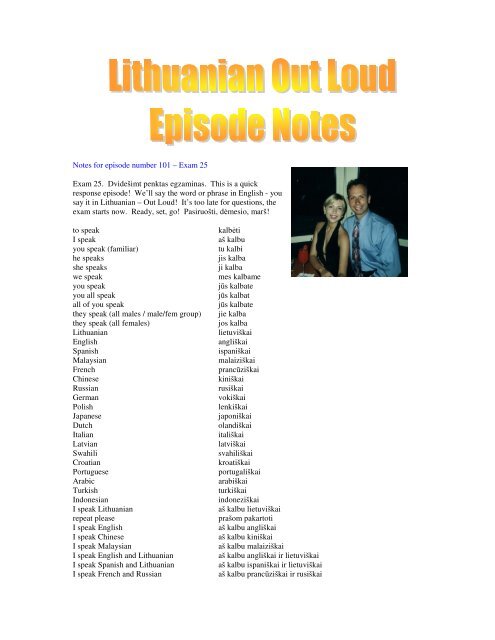
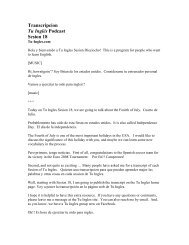

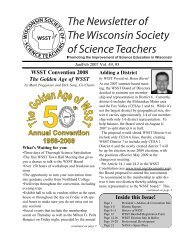

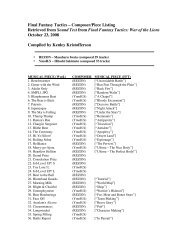
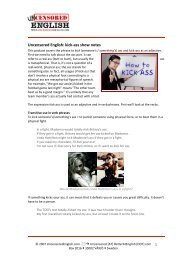
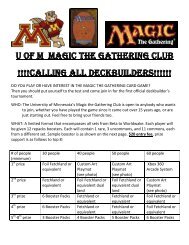
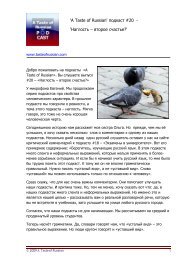
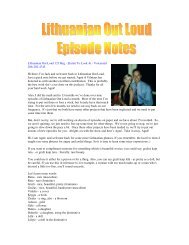
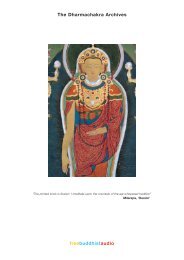

![[Las respuestas empiezan en la pagina 8 ] Tu Inglés ... - Libsyn](https://img.yumpu.com/18098853/1/190x245/las-respuestas-empiezan-en-la-pagina-8-tu-ingles-libsyn.jpg?quality=85)
